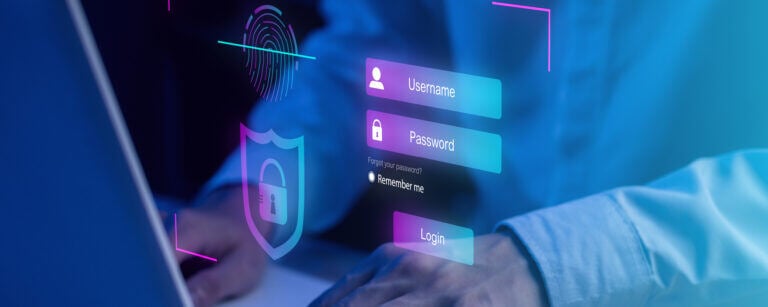Cybersecurity Essentials for Small Businesses
Introduction: The Cyber Landscape for Small Businesses
February 8, 2024
The rate of cyber attacks against small businesses has skyrocketed in recent years. Smaller businesses do not have the resources and capabilities to build the robust security structure needed to defend against the ever-changing threat landscape. Last year, 82% of ransomware attacks targeted businesses with less than 1,000 employees. That staggering number is just one of the reasons why organizations need to develop a multi-faceted approach to resilience with cybersecurity essentials for small businesses.
Cyber threats take many forms, from stealthy phishing attacks that aim to exploit human vulnerabilities, to ransomware attacks that hold critical data hostage. Small businesses, unlike larger enterprises, can find themselves disproportionately impacted by these threats, risking financial loss, reputational damage, and even continuity of their operations. According to Cybercrime Magazine, 60% of small companies go out of business within six months of falling victim to a data breach or cyber attack.
Small businesses can be empowered with a digital fortress of security by utilizing some of the steps outlined in this article.

1. Utilize third-party security risk assessments
Regular risk assessments help small businesses to stay ahead of emerging threats, ensuring that security measures evolve in tandem with the dynamic threat landscape. It’s not about merely reacting to known risks; it’s about anticipating and mitigating potential risks before they escalate. This proactive approach is particularly effective for small businesses, so they can prioritize security initiatives based on identified risks and vulnerabilities. Independent risk assessments provide a foundation for crafting or refining cybersecurity policies, tailoring them to the specific vulnerabilities and challenges faced by the business. Regular risk assessments transform the cybersecurity from a reactive endeavor to a strategic, forward-thinking practice, fortifying small businesses against ever-changing cyber threats.
2. Cultivate a culture of security
The first line of defense is not just technological; it’s cultural. Small businesses must cultivate a workplace that values cybersecurity. Employees must be educated on the importance of security measures, from strong password practices to reporting suspicious activities. When cybersecurity becomes ingrained in the company culture, it transforms every employee into a vigilant guardian of your digital assets. Your employees are on the front lines, with most common attacks beginning with a phishing email. In order for your employees to be able to defend your organization, they must be armed with information and the incentive to care.
3. Create an incident response plan
Preparedness is paramount. Organizations need to craft a comprehensive incident response plan that outlines step-by-step procedures in the event of a cybersecurity breach. This plan should encompass identification, containment, eradication, recovery, and lessons learned. The plan should be regularly reviewed and tested to ensure it evolves with the dynamic threat landscape, providing a structured and efficient response when needed.
4. Establish a security team lead
A dedicated team spearheading cybersecurity efforts is indispensable. Small businesses should form a security committee or team with a clear team lead, responsible for overseeing security initiatives and ensuring that the plans laid out by the organization are followed. This approach ensures that cybersecurity is not just an IT concern but a company-wide commitment. It adds a layer of accountability and guarantees the team has visibility and accountability into the security of the organization.
5. Ensure multi-factor authentication (MFA) use
Multi-Factor Authentication (MFA) is a strong defender against unauthorized access. Companies should mandate the use of MFA across all relevant systems and applications. By requiring multiple forms of verification, such as passwords and mobile authentication, MFA adds an extra layer of protection, significantly reducing the risk of unauthorized account access. While MFA is a tried-and-true way to protect your information, your people are still your best defense. According to Duo, “You must let your users know that security teams will never call or message them asking to verify an unknown push or share information like authentication codes. You must explain how MFA bypass attacks work so that your users can recognize them for what they are. And then tell your users who they should notify if they experience one of these attacks.”
6. Capitalize on cloud security
Embracing cloud technology is not just about efficiency; it’s also about security. Small businesses should utilize the built-in security features provided by reputable cloud service providers. There is a common misconception that all your data is inherently secure in a cloud environment, which is simply not true. The cloud service provider, however, is responsible for the security OF the cloud, while you are responsible for security IN the cloud. This is the shared responsibility model. Companies like Microsoft, AWS, and Google invest millions of dollars in the security and protection of their environments and their products. Whether it’s data encryption, access controls, or continuous monitoring, cloud platforms offer robust, built-in security measures that, when utilized effectively, are unmatched by on-premises systems monitored by small teams.
In conclusion, cybersecurity is not merely a defensive measure; it’s a strategic imperative for small businesses aspiring to thrive. By instilling a culture of security, businesses can build a resilient defense against cyber threats. This proactive stance not only protects valuable assets but also fosters trust among clients and partners, paving the way for sustainable growth and success.
Cyber threats are ever evolving, and keeping up with the changes is a 24/7/365 business for managed services providers like BCS365. It has become nearly impossible for small businesses to invest in the technology and people necessary to protect against the growing number of threats, and that is why all-inclusive, outsourced cybersecurity is the best security model for most small businesses.




